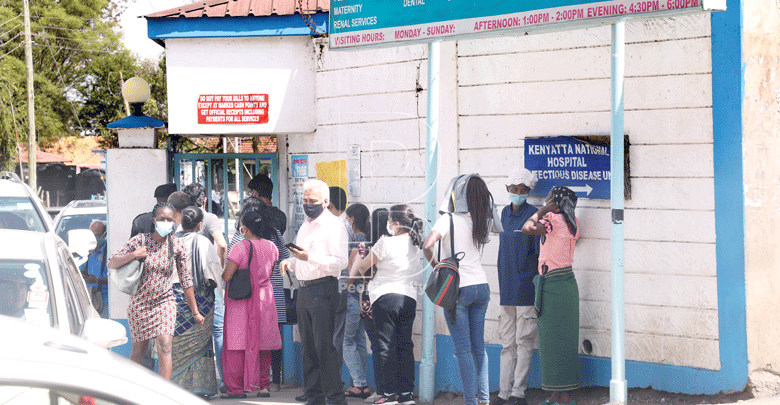Crisis looms as Covid patients flood hospitals

The country’s largest hospitals are on the brink of being overrun by Covid-19 patients as almost all Intensive Care Unit (ICU) beds in Nairobi were fully occupied with those seeking new admissions being turned away.
With the country recording the highest positivity rate ever at 22 per cent yesterday on a day that 12 people succumbed to the virus, hospitals in the city and its environs are struggling to cope with a record spike in Covid-19 cases.
Medics are now warning that Kenya could be facing a health crisis as the third wave of the pandemic continued to strike, with high numbers of new infections and fatalities.
At the Kenyatta National Hospital (KNH), East Africa’s biggest referral facility, a source told People Daily yesterday that the institution’s Intensive Care and High Dependency Units are overflowing with critical patients, leading to a spill-over to the general wards. By Sunday evening, the source confirmed that the hospital had stopped admission of new patients.
“We are overwhelmed. The two units for critical patients are full to capacity.
The hospital is not admitting any more Covid-19 patients until we discharge,” the source said even as hundreds of vaccine seekers including diplomats together with frontline workers flocked Mbagathi hospital for the jab.
At the Mbagathi County hospital, a source intimated that all ICU beds were fully occupied and any admissions can only be made after discharging the currently admitted patients.
A spot-check at the facility witnessed long queues of people scrambling to be vaccinated.
The situation was no different at Nairobi, Karen, MP Shah, Aga Khan and Nairobi West hospitals, with Kenya University Teaching, Referral and Research Hospital (KUTRRH), Mama Lucy and Avenue Nursing homes also indicating that they were not in a position to admit any more patients.
All the Nairobi Hospital’s 16 ICU beds at the main hospital and 15 at its UN branch are full to capacity. Same is the case at Aga Khan where all the 15 beds are full.
Other than the city, almost all hospitals in Machakos, Kiambu, Nakuru, Eldoret and Mombasa counties have reportedly hit their capacity.
In his weekly briefing yesterday, Health Cabinet Secretary Mutahi Kagwe admitted that though the hospitals have been outstretched, they are yet to be overrun.
Contaiment measures
“We have witnessed a huge number of hospitalisation lately. The number of those being admitted to our ICUs has especially shot up,” Kagwe disclosed yesterday.
By yesterday, 121 patients were in ICUs, 32 of whom were on ventilatory support.
This is double the number recorded at such a time in January when only 27 people were in intensive care, out of whom 16 were on ventilatory support.
Another 2, 545 infected people are on home-based and isolation care compared to 1, 553 two months ago.
Since last week, the country has seen four consecutive daily increases of more than 15 deaths, raising alarm among medics and government officials.
“Looking at these statistics, we can very easily get discouraged,” Kagwe said as he went on to assure that the government is working round the clock to increase the number of ICU beds and HDU centres at national and county hospitals.
The blunt warning from Kagwe came as experts cautioned that the government needs to relook at some of the contaiment measures put in place and tighten them more.
Dr Githinji Gitahi, the group CEO of Amref Health Africa, says the protocols appear to be too lax and are being flouted too often by people meeting and congregating in entertainment spots, supermarkets, markets, churches and other social joints.
“The country could facing the most dangerous situation anyone can remember.
Very soon, hospitals wont’t have room to take redirected emergency cases… staff-to-patient ratios, which are already stretched, will become unacceptable even in places like ICUs. There will be avoidable deaths,” Gitahi warned.
Increase the capacity
Like Gitahi, Dr Moses Masika, a virologist and lecturer at the University of Nairobi, warned that Kenyans had dropped their guard.
“People relaxed by December after the cases went down thinking that normalcy had returned.
But we are not out of the woods yet. This third wave may strike us very hard,” he warned.
Last week, Health Chief Administrative Secretary Mercy Mwangangi warned that the country was staring at a crisis after it emerged that all ICU beds in Nairobi County were full to capacity while in other counties only a few were remaining.
She said during a Parliamentary Health Committee meeting that it is not a matter of if any more but when this will strike as already the country had reported an increase in the number of Covid 19 patients.
“Yes, we are seeing an increase in the number of admissions in the ICU which is definitely a third wave.
As of yesterday (last Tuesday) 11pm all the ICU beds in Nairobi county were full while in counties only a few are remaining, “ she said.
On Sunday evening, it emerged that hospitals in the country are overwhelmed as cases of critical Covid-19 patients continued to surge.
Doctors say most of the beds in ICUs have been taken up by Covid-19 patients.
At Kenyatta University, all the 32 ICU beds are fully occupied by Covid-19 patients, forcing the management to explore other alternatives as new cases were brought in.
In a bid to contain the situation, the hospital announced plans to unveil additional 30 ICU beds by end of the week.
The facility’s board of management chairperson Prof. Olive Mugenda said the new beds will increase the capacity to 62 in a move aimed at replenishing the referral facility’s ability to handle emergency Covid-19 cases.
“Our ICU is full but in three or four days, we shall open 30 more beds. We are working hard on that to ensure that we bridge the current gap,” she said.
Going by the approximate estimate of Sh4 million required to set up one ICU bed, the referral hospital hopes to spend Sh120 million for the cause that is projected to save lives.
Speaking in Gatundu South, Kiambu Governor James Nyoro, who had accompanied Mugenda to inspect the progress of collaboration between KUTRH and the county to run and manage local health facilities including upgrading Gatundu Level Five Hospital to a level six, said the devolved unit has 1,000 isolation beds most of which remain unoccupied but are ready to admit patients infected with the virus. – George Kebaso, Mathew Ndung’u and Mercy Mwai









